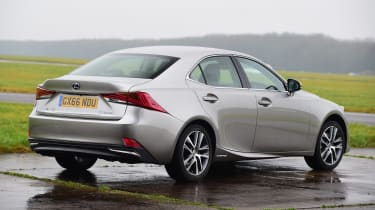Lexus IS saloon - MPG, running costs & CO2 (2013-2020)
The Lexus IS hybrid promises some very impressive economy numbers, but they can be difficult to match in the real world
If good fuel economy and low running costs are a priority, the Lexus IS 300h hybrid can stack up well against petrol and diesel rivals, making it a good choice for company-car buyers.
Lexus IS MPG and CO2
Lexus says the IS 300h's combination of a four-cylinder petrol engine and an electric motor return up to 67.2mpg, but in our experience this is hard to achieve in real-world driving – more so than some diesel rivals, such as the BMW 320d. However, CO2 emissions of 97g/km mean company-car drivers’ Benefit-in-Kind (BiK) tax liability will be low.
Depending on which trim levels and wheels you go for, CO2 emissions range from 97 to 99g/km, but the BiK tax bracket remains unchanged. Under the current road tax system, the hybrid IS attracts a slightly lower annual bill than petrol or diesel models. Top-spec cars costing over £40,000 will incur an additional road tax surcharge in years two to six, making it rather costly during that period.
Insurance group
Executive cars tend to be fairly expensive to insure, and the IS 300h’s group 28-30 rankings (out of 50) mean premiums will be pretty pricey. In fairness though, the BMW 3 Series gets similar ratings unless you choose the entry-level BMW 3 Series.
Warranty
Although Lexus is the luxury division of mainstream manufacturer Toyota, it doesn’t offer its parent company’s five-year/100,000-mile warranty. Instead, the IS will be covered for three years or 60,000 miles - although the hybrid components and battery of the IS 300h are covered for five-years or 100,000 miles. You also get a three-year paintwork and surface rust warranty and a 12-year anti-corrosion warranty for the bodywork.
Servicing
The Lexus IS needs to visit the dealer once a year or every 15,000 miles – whichever comes first. Services alternate between intermediate and full, with intermediate costing around £250 and full costing around £450. At 60,000 miles a ‘Full+60’ check is required, costing £650 and involving the replacement of some wear-and-tear items,’ while if you still have your IS at 100,000-mile mark, it will need a ‘Full+100’ service, which costs £600.












